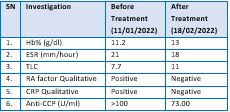Effect of some Ayurvedic Anti-Rheumatic preparation supplemented with Masooradi Yoosha in Amavata (Rheumatoid Arthritis) : A Case Report
Keywords:
Masooradi Yoosha,, Simhnada Guggulu,, Amavata,, Rheumatoid Arthritis,, Case ReportAbstract
Amavata is a sickness that develops when the Vata Dosha connected with Ama becomes aggravated. Aggravated Vata circulates Ama throughout the body via Dhamanies, seeks refuge in the Shleshma Sthana (Amashya, Sandhi, and so on), and manifests as Angmarda, Aalasya, Gaurav, Jwara, and other symptoms in tiny and large joints, deforming the person. In modern parlance, it simulates rheumatoid arthritis. Chakradatta explains Langhan as the first component of Amavata's Chikitsa Sutra. Pain and swelling in various joints, as well as morning stiffness lasting more than 60 minutes, were reported by a 50-year-old female patient. Simhanada Guggulu and Rasnasaptak Kashayam, as well as Masooradi Yoosha as Pathya, were prescribed as part of a 30-day integrative intervention. The Rheumatoid Factor qualitative and CRP qualitative was positive before treatment and found negative after treatment. Anti- CCP was >100 U/ml before treatment and it lower down to 73 U/ml after treatment. Simhnada Guggulu with Anupana of Rasnasaptak Kashayam followed by Masooradi Yoosha as Pathya showed remarkable relief in symptoms and serological markers such as RA factor qualitative, CRP qualitative, Anti-CCP and ESR. Diet is an effective modality in the management of Amavata.
Downloads
References
Upadhyaya Y, editor Madhava Nidana of Madhavkar, Chaukhambha Prakashan, Edition 2014, Chapter 25/2,6. Page 508,509,511
"Handout on Health: Rheumatoid Arthritis". National Institute of Arthritis and Musculoskeletal and Skin Diseases. August 2014. Archived from the original on June 30, 2015. Retrieved July 2, 2015
Smolen JS, Aletaha D, McInnes IB (October 2016). "Rheumatoid arthritis" (PDF). Lancet. 388 (10055): 2023–2038. doi:10.1016/S0140-6736(16)30173-8. PMID 27156434. S2CID 37973054.
Shah A (2012). Harrison's Principles of Internal Medicine (18th ed.). United States: McGraw Hill. p. 2738. ISBN 978-0-07174889-6.
Zhang X., Zhang D., Jia H., et al. The oral and gut microbiomes are disturbed and unsettled in rheumatoid arthritis and partly normalized after treatment. Nature Medicine. 2015; 21(8):895–905. doi: 10.1038/nm.3914.
Duerkop B.A., Vaishnava S., Hooper L.V. Immune responses to the microbiota at the intestinal mucosal surface. Immunity. 2009; 31:368–376. doi: 10.1016/j.immuni.2009.08.009.
Valdes A.M., Walter J., Segal E., Spector T.D. Role of the gut microbiota in nutrition and health. BMJ. 2018;361: k2179. doi: 10.1136/bmj. k2179.
Uhlig, T., Moe, R.H. & Kvien, T.K. The Burden of Disease in Rheumatoid Arthritis. Pharmaco Economics 32, 841–851 (2014). https://doi.org/10.1007/s40273-014-0174-6
Chakradatta Ratnaprabha By Mahamahopadhyaya Sri Niscala Kara, edited by Prof. Priya Vrat Sharma Published by Swami Jayaramdas Ramprakash Trust Jaipur, 1993, Amavata Chikitsa 25/29-34 p-427
Chakradatta Ratnaprabha By Mahamahopadhyaya Sri Niscala Kara, edited by Prof. Priya Vrat Sharma Published by Swami Jayaramdas Ramprakash Trust Jaipur, 1993, Amavata Chikitsa 25/1 p-166.
Bhaisajya Ratnavali with Siddhiprada Hindi Commentary by Kaviraj Govind DasSen, edited by Prof. Siddhi Nandan Mishra, Chaukhamba Surbharati Prakashan, Varanasi, 2022 Chapter 29 Shlok no. 23
Susruta, Susruta Samhita, Part I, Ayurveda Tattav Sandeepika Hindi Commentry by Ambikadutta Shastri Chaukhanbha Sanskrit Sansthan, Varanasi, Reprinted edition, 2016; Sutrasthana 46/373,374 Page-274
Acharya Sharangdhara, Sharangdhara Samhita, Jiwanprada Hindi commentary, 4’th edition, Chaukhambha Orientalia,2005, Madhyama Khanda 2/156, Page-158.
Shaw B.P., Ayurvediya Pathyapathya Vijnana, Choukhamba Krishnadas Academy, Varanasi, 2012, p-314.
Upadhyaya Y, editor Madhava Nidana of Madhavkar, Chaukhambha Prakashan, Edition 2014, Chapter 25/2,6. Page 508,509,511
Xu BJ, Chang SKC. Phenolic Substance Characterization and Chemical and Cell-Based Antioxidant Activities of 11 Lentils Grown in the Northern United States. J Agric Food Chem. 2010;58:1509–1517.
Zou, Y., Chang, S. K., Gu, Y., & Qian, S. Y. (2011). Antioxidant activity and phenolic compositions of lentil (Lens culinaris var. Morton) extract and its fractions. Journal of agricultural and food chemistry, 59(6), 2268–2276. https://doi.org/10.1021/jf104640k
Effects of ionizing radiation on microbial decontamination, phenolic contents, and antioxidant properties ofTriphala. (Kumari N, Kumar P, Mitra D, Prasad B, TiwaryBN, Varshney L.Microbial & Molecular Genetics Lab, Dept. of Botany, Patna Univ., Patna 800 005, India.
Biological screening of 100 plant extracts for cosmetic use (II): anti-oxidative activity and free radical scavenging activity. (Kim BJ, Kim JH, Kim HP, Heo MY. College of Pharmacy, Kangwon National University, Chuncheon, Korea.
Singh, N., P. Verma, and B. R. Pandey. “Therapeutic potential of organic triticum aestivum linn. (wheat grass) in prevention and treatment of chronic diseases: an overview”. International Journal of Pharmaceutical Sciences and Drug Research, Vol. 4, no. 1, Jan. 2012, pp. 10-14, https://www.ijpsdr.com/index.php/ijpsdr/article/view/166.















